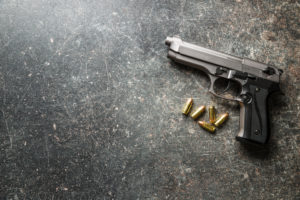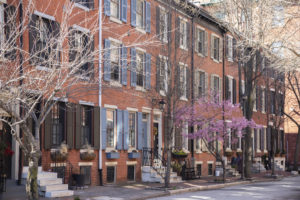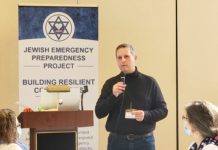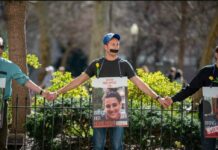
In pandemic-era Philadelphia, gun violence is a catastrophic and ongoing problem.
Two years ago, the city suffered through 499 homicides, outpacing the number from any 12-month period in the 2010s. Last year, the city endured 562 homicides, breaking the record of 503 set in 1990. And in 2022, Philadelphia is on pace to surpass that ignominious mark once again.
A serious Philadelphia County issue impacts all city residents, regardless of demographic group, so this one affects Jewish Philadelphians as well.
A 2019 population survey conducted by the Jewish Federation of Greater Philadelphia found that Jews live in significant numbers in almost every section of the city. More than 10,000 Jews reside in Northeast Philadelphia, Northwest Philadelphia, North Philadelphia and West Philadelphia, while more than 30,000 Jews live in Center City. South/Southwest Philadelphia is the only region with fewer than 10,000 Jewish residents, counting just over 4,000.
The City of Philadelphia tracks homicide victims by race, age and sex, but not religion. And the Jewish Federation focuses its population study on regions, not neighborhoods. Both factors make it hard to find out how many local Jews were victimized by gun violence.
But it is possible to examine whether shootings and homicides are happening in Jewish-populated regions. All Philadelphia Police Department numbers include the last two years.
Luckily for the Jewish community, gun violence is having the least impact in Center City, where the most Jews live. Philadelphia’s hub experienced 13 shootings and two homicides between 2020 and ’21, according to police data.
“What we know about Jewish households in Center City is that they tend to be younger families that I’m sure are vigilant in deciding where they’re going to raise young children,” said Lindsay Weicher, the Jewish Federation’s data strategist. “I wouldn’t be surprised if these households were to say, we’re choosing to live in Center City because it’s safer.”
And it is much safer than other regions in the city.
Northeast Philadelphia, the second-most populous Jewish area with more than 19,000 residents, experienced 85 shootings and 30 homicides over the past two years.
Northwest Philadelphia, the third-most populated Jewish region with more than 13,000 people, suffered through 199 shootings and 40 homicides in 2020 and ’21. West and North Philadelphia, both with more than 12,000 Jewish residents, endured more violence than the other regions; West Philadelphia experienced 229 shootings and 50 homicides and North Philadelphia suffered through 915 and 223, respectively.
South/Southwest Philadelphia also saw violence, with 84 combined shootings and 22 combined homicides over the past two years.
“We know there are Jewish households in all neighborhoods,” Weicher said. “So any kind of issues affecting a particular community or neighborhood, Jewish communities will not be excluded from dealing with those issues.”
Weicher and Jewish Federation Senior Director of Security Frank Riehl don’t think this issue should dissuade Jews from living in the city. But they did say that Jews who choose to live in Philadelphia should stay alert.
Riehl advised Jewish residents to avoid looking down at their phones while walking through the city. Weicher said to “remain vigilant to mitigate the impact it may have on your household or your community or your circle of contacts.”
She mentioned that households with older children, roughly 12 and up, tend to move out to the suburban counties, though that was already a trend before 2020.
“I’m sure it’s one of many factors that goes into deciding where to raise young families,” Weicher said of gun violence.

But while young families may trend toward the suburbs at a certain age, they also may live anywhere within city limits, alongside other Jews. Jewish Federation realized that when it completed its last population study, which shows that Jews live throughout the city.
Instead of just cold-calling households, it mailed surveys to addresses. And instead of just asking people if they were Jewish, it asked if they were Jewish by religion, ethnicity, culture and/or heritage.
The new methodology helped Jewish Federation reach people who didn’t use landlines and count the types of Jews it never counted in the past.
“It’s not just, ‘Are you Jewish and affiliated by denomination?’” Weicher said. “That would exclude households.”
In broadening the definition of the Jewish population, Jewish Federation figured out that Jews live in all regions of the city. The old “all Jews live in Center City or the Northeast” stereotype simply does not apply. Therefore, any city issue is necessarily a Jewish issue.
“It was an opportunity to reevaluate our perception of what the community looks like,” Weicher concluded. JE







Voting tends to be heavily Democratic in Philadelphia. With that you get the “soft on crime” D.A Krasner. Elections have consequences.